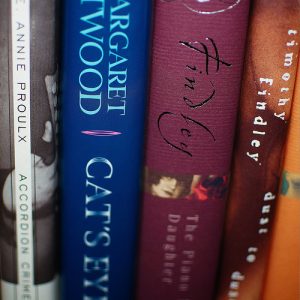 Whether we like it or not, the book has been on the decline since television began invading family homes in the 1950s. This decline has only been accelerated with the recent progress of video technology; video media is no longer confined to TV sets and movie theatres but is now available on everything from computers to cell phones to iPods. Even the book itself is joining the electronic world. Thanks to e-books and the Kindle, actual printed books themselves are swiftly disappearing.
Whether we like it or not, the book has been on the decline since television began invading family homes in the 1950s. This decline has only been accelerated with the recent progress of video technology; video media is no longer confined to TV sets and movie theatres but is now available on everything from computers to cell phones to iPods. Even the book itself is joining the electronic world. Thanks to e-books and the Kindle, actual printed books themselves are swiftly disappearing.
Now, it would be foolish to say that reading will ever disappear. The written word is a necessary form of communication, despite the fact that many of its prior functions have been usurped by video. Reading as entertainment, however? Like it or not, it seems that ship is ready to sail – a statement many academics would consider blasphemous. Yet no matter how warmly and nostalgically we feel about the smell of the pages of a well-worn novel, or the beautiful binding of a rare, exquisite book, the fact is that novel-readers are rapidly becoming an ever decreasing minority.
As attached as we are to books, and as much as we will always enjoy the works of Dickens and Tolstoy, it’s wrong for academics to prematurely mourn what they see as the imminent death of literature. What, after all, is literature? Once upon a time, scholars would have been aghast if someone was to consider Shakespeare’s printed folios as “literature” – literature was poetry! Novels, too, were initially scorned as inferior, and seen as nothing more than entertaining, popular drivel for the masses.
Yet what is literature other than entertainment with substance? Chaucer, Shakespeare, Wordsworth, Twain – all were highly popular entertainers during their time. What separates them from their lesser talented – though perhaps as popular – peers is posterity. If a work can move from the masses to the appreciation of scholars, and thus history, the wheat is separated from the chaff, and we are left with that which is both art and entertainment: literature.
The masses have turned to television, the inevitable result of a fast-paced, technologically savvy society. But does this mean the death of literature? Of course not! After all, Shakespeare’s plays were written to be performed, were they not? And did not Dickens, Tolstoy and other great writers publish their novels in serialized form, exactly like a weekly TV show? It seems that future generations of critics are going to be studying screenplays, not novels, as screenplays are quickly becoming the only relevant cultural medium. If someone writes the great Canadian novel or the best set of sonnets the world has ever seen, what good will it do if the world won’t bother reading them?
Some of the greatest works of literature already await us on the screen. Mark my words, while Two and a Half Men, Reba, and Everybody Loves Raymond will ultimately disappear into the void, a hundred years from now students will be studying Rome, Six Feet Under, and The Wire. There’s no point in kicking against the inevitable; it’s time to embrace the new and exciting products of the minds of our time. The medium, in the larger scheme of things, is irrelevant.


